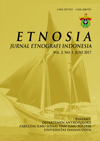Mereka yang Tidak Dibayar Tinggi: Ibuisme, Taman Kanak-kanak, dan Kampung di Indramayu
DOI:
https://doi.org/10.31947/etnosia.v3i2.3612Keywords:
housewives, ibuism, kampung, moral burden, community pressure.Abstract
The ideology of state-ibuism has always been interwoven with how the New Order regime until nowadays government constructing the “ideal” role of women in the family and community through the PKK (Pembinaan Kesejahteraan Keluarga) organization. However, in Cangkring Village, Indramayu, the ideology of ibuism works not because of the massive government regulating the role of women through the PKK organization, but it is possible because of the structure of the kampung community itself. Through involved observations and in-depth interviews about a kindergarten in the village, a group of housewives who dedicated themselves to teaching in kindergarten were met without getting paid high. From these socio-cultural phenomenons, this paper will describe descriptively and analytically that housewives in the Cangkring village are willing to become kindergarten teachers because of their moral burden as part of the warga kampung and also from community pressure from people who want their children to be able to read and write.Downloads
References
Antlov, Hans. (2002). Negara dalam Desa: Patronase Kepemimpinan Lokal. Yogyakarta: Lappera Pustaka Utama
Djajadiningrat, Madelon. (1992). “Ibuism and Priyayization: Path to Power?” dalam Locher-Scholten, E. & A. Niehof (peny.) Indonesian Women in Focus. Leiden: KITVL Press.
Harold, Garfinkle., (1967). Studies in Methodology. Englewood Cliffs, NJ: Prentice-Hall
Geertz, Hildred. (1961). The Javanese Family. New York: Free Press of Glencoe
Hughes, Nancy Scheper. (1989). Death Without Weeping: The Violence of Everyday Life in Brazil. Berkley: University of California Press
Newberry, J. (1992). Back Door Java: Negara, Rumah Tangga, dan Kampung di Keluarga Jawa. Diterjemahkan oleh Bernadetta dan Masri Maris (2013).Jakarta: Yayasan Obor Indonesia
Newberry, J. (2016). “Kelas Mobil: Sirkulasi Anak-anak dalam Membangun Indonesia Kelas Menengah” dalam Klinken, G. V. (peny.)In Search of Middle Indonesia. Diterjemahkan oleh Yuku Aditya.Jakarta: Yayasan Obor Indonesia
Newberry, J. (2017). Anything Can Be Used to Stimulate Child Development: Early Childhood Education and Develompnet in Indonesia as a Durable Assemblage. The Journal of Asian Studies. Hal. 1-21
Newberry, J. (2017). Interiority and Government of The Child: Transparency, Risk, and Good Governance in Indonesia. Journal of Global and Historical Anthropology Vol. 77. Hal. 77-89
Shiraishi, Saya Sasaki., (1997). Pahlawan-pahlawan Belia: Keluarga Indonesia dalam Politik. Diterjemahkan oleh Seno Gumira Ajidarma, dkk (2001) Jakarta: Gramedia Pustaka Utama
Suryakusumah, Julia. (1988). Ibuisme Negara: Konstruksi Sosial Keperempuanan Orde Baru. Depok: Komunitas Bambu
Suryaningsi, T. (2017). Ranger Pink: Perempuan Pekerja Tambang di Antara Dua Dunia. Etnosia: Jurnal Etnografi Indonesia, 2 (1). 19-39. DOI: http://dx.doi.org/10.31947/etnosia.v2i1.2959
Wicaksono, M. A. (2017). Ibuisme Masa Kini: Suatu Etnografi tentang Posyandu dan Ibu Rumah Tangga. UMBARA Indonesian Journal of Anthropology, 1(2).
Williams, Raymond. (1977). “Structure of Feeling” dalam Steven Lukes (ed.).Marxism and Literatures. Oxford: Oxford University Press
















1.png)





